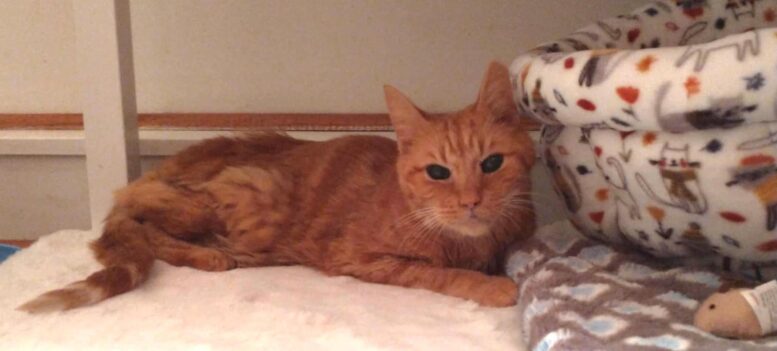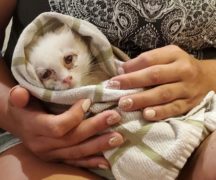By JULIE CARLE
BG Independent News
Harry the cat has some wizarding ways.
Whether the yellow-orange tabby named for Harry Potter cast a spell or had a spell cast on him, he magically survived a year in an abandoned house in Bowling Green.
He was rescued on Dec. 22 by the local grassroots organization For the Love of Cats, and then placed in the cozy, loving foster home of cat-loving Bonnie Waterfield.
The rescue was nearly a year to the day after Waterfield first noticed the cat had been left in the home. Several cats had been removed from the house by a different organization after the owner was moved to an assisted care facility. Because of Harry’s wily ways, he defied the odds and was left behind when he “wouldn’t go into the trap,” Waterfield said.
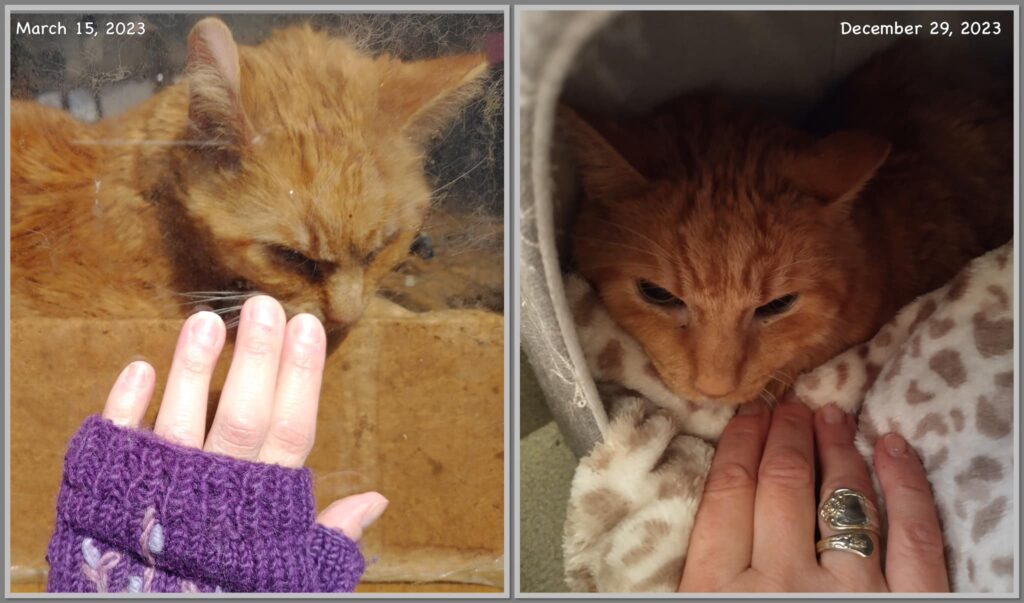
Harry apparently survived on bags of cat food that were left, said Julie Martini, For the Love of Cats co-founder with husband Kevin Mercer. They, along with Waterfield, did not give up on rescuing the cat. It took a while, but eventually, with the help of an attorney, they gained access to the house, trapped Harry and began his journey toward a comfortable and cared-for life.
He was scared, especially when it came time to visit the vet, but he has done well so far, Martini said. Sometime in his life, he had been neutered, as evidenced by the telltale tipped ear, which means someone had cared for his wellbeing.
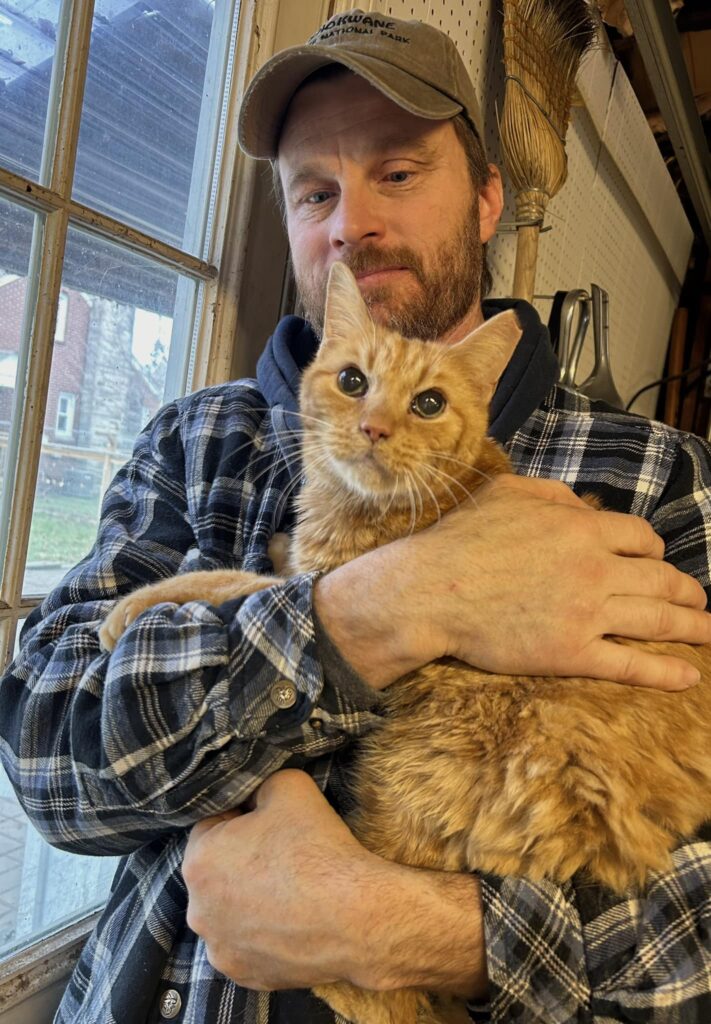
Because Harry was already neutered, that was one less step needed by the organization that focuses on “TNR” or Trap, Neuter, Return. During the vet visit, they learned he was about 15 years old, mostly blind and with significant thyroid and dental issues from surviving on his own for the past year.
In Waterfield’s care, “Harry is living his best life and getting the care he needs,” Martini said.
For the time being, he is separated from other cats that Waterfield is fostering, with his own space, his own comfortable bedding and even his own Christmas stocking and gifts, Waterfield said.
“He’s a little shutdown but is responsive to touch,” Waterfield said. “He may be blind, but he is definitely resourceful to have survived for a year.”
He’s been offered a buffet of food choices. He’s not keen on chicken and rice—her usual go-to for finicky cats—but enjoys the soft texture and taste of baby food.
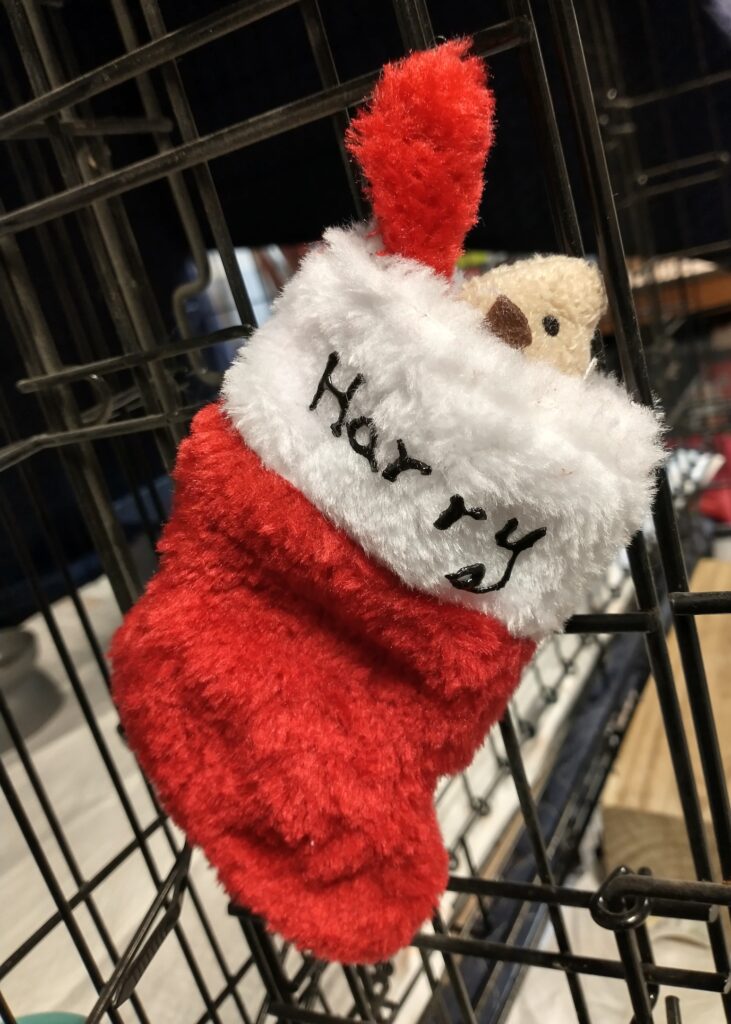
Harry is not her first cat to foster, but is already a favorite since she has been concerned with his welfare since she first learned of his situation. She heard about For the Love of Cats when they were looking for fosters. “I immediately knew Julie was my person. I wanted to find a way to be useful and fostering some of the cats worked for my situation,” Waterfield said.
For the Love of Cats was started about four years ago after Martini and Mercer realized homeless cats were a problem beyond the colony that they found in their neighborhood near the Wood County Courthouse.
They realized the issue with feral, homeless cats in the city went beyond their neighborhood. One day when they were dropping off a stray cat for TNR at Midway Animal Hospital, where the majority of the procedures are done, they had a serendipitous encounter with the Fourth Ward Felines, another volunteer group in town doing similar work in the city’s fourth ward.
“There’s a problem in town, and we decided to advocate for the humane treatment of community cats by controlling their population. We also wanted to educate the public about why TNR is effective,” Mercer said.
In 2023, the organization successfully trapped, neutered and returned 256 cats in need and adopted out nearly 100 other cats and kittens. They also officially became a became a 501 (c) 3 nonprofit organization.
TNR helps reduce the number of stray kittens, cuts down on male cats fighting within colonies and lessens the spread of disease, Martini said.
“However, until 60% of the homeless cats are spayed and neutered, you aren’t really controlling the population,” Mercer added.
Despite the sometimes-overwhelming obstacles, the couple is dedicated to the cause and making a difference. However, they incur much of the costs themselves. The veterinarians provide a reduced rate for spaying and neutering the cats, but they still have to charge a fee, Mercer explained.
“Often because the TNR cats are homeless, people often say, ‘It’s not my problem,” but it is a community-wide concern, she said.
Though they are not a shelter, they do offer the socialized cats for adoption and request a fee but that still doesn’t cover the cost of veterinary care, food and supplies, he said.
“We rely on volunteers, fosters and donors to help,” Martini said. People like Waterfield, who help foster and transport the cats, along with many of the colony caregivers, are part of a strong and loyal community that cares for homeless cats and kittens in town.
Information about how to help For the Love of Cats and other cats like Harry is available on the organization’s website.

